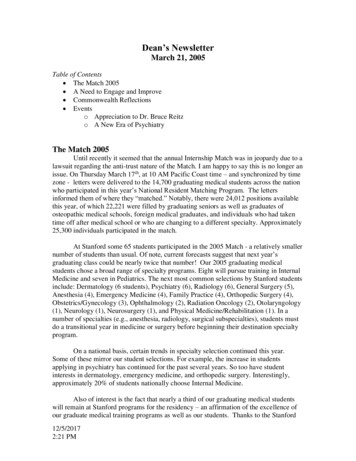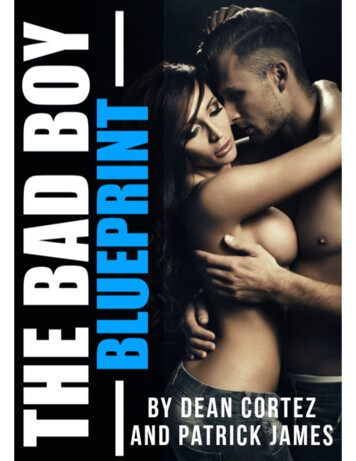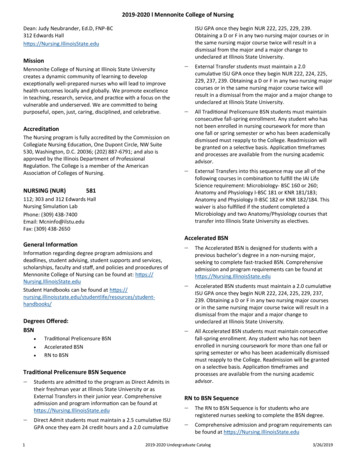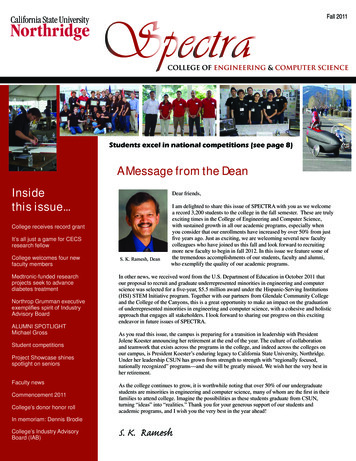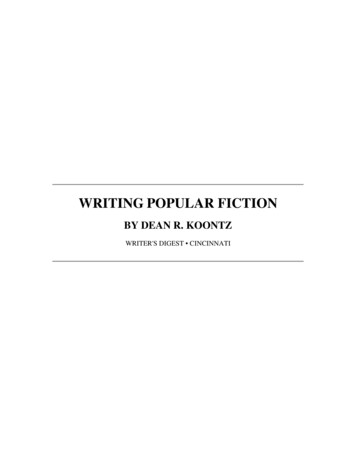
Transcription
WRITING POPULAR FICTIONBY DEAN R. KOONTZWRITER'S DIGEST CINCINNATI
ACKNOWLEDGEMENTSPodkayne of Mars is copyright 1963, by Robert A. Heinlein, and is published inhardcovers by G.P. Putnams Sons. The Puppet Masters is copyright 1951, by Robert A.Heinlein, and is published in hardcovers by Doubleday and Company, Inc. The sectionsfrom these works appearing in this book are reprinted by permission of the author and hisagent Lurton Blassingame. Quotations from Thorns, Nightwings, and The Masks of Timeare copyright 1967, 1968, and 1969 by Robert Silver-berg, and are reprinted bypermission of the author and his agent Scott Meredith Literary Agency, Inc. Big Planet iscopyright 1957 by Jack Vance and is quoted by permission of the author. Don't Lie to Meis copyright 1972 by Tucker Coe, published in hardcovers by Random House, and isquoted by permission of the author and his agent Henry Morrison. Legacy of Terror,Demon Child are copyright 1971 by Deanna Dwyer and are quoted by permission of theauthor. The Haunted Earth is copyright 1973 by Dean R. Koontz. The appearance of theoriginal sample chapter and outline, from which it was sold, is by permission of LancerBooks.Design: Fred LiebermanSecond printing, 1974.Library of Congress Catalog Card Number 72-92664ISBN 0-911654-21-6Writer's Digest 9933 Alliance Rd., Cincinnati, Ohio 45242Copyright 1972 by Dean R. Koontz. All rights reserved Printed in the United States ofAmerica
ToLynne Ellinwood, whose suggestions made thisa much better book than it might have been,And toRobert Hoskins,who taught me mostof what I'm now teaching,with apologiesfor beating him to the punchwith this book
A NOTE TO THE READERThis book can be valuable to the new writer. It provides insights into category fiction,offers suggestions not to be found elsewhere, and ought to save you time and rejectionslips on the way to a sound, professional writing career. I will be pleased to hear fromanyone who, having read the book, feels he's gained from it. However, spare me lettersthat say:—"You forgot to mention theme!" I didn't forget. I neglected it on purpose. The theme,the "meaning" of a story, is not something you can sit down and plan out ahead of time.Or, anyhow, it shouldn't be. Theme should grow from your characters and your plot,naturally, almost subconsciously. If you sit down to deliver a Great Message to thereader, above all else, then you are an essayist, not a novelist.—"Some of these writers whose books you recommend are not really that terribly good."I know. For the most part, I've tried to point you to the best people in each field. But,occasionally, a mediocre writer achieves such stunning success that he must bementioned in the discussion of his genre. If, out of the hundreds of books I recommend, Isteer you to a couple of bums, please realize that you can learn something from thosebums, if only the taste of a large part of that genre's readership.-"You list seven science fiction plot types, but I have found an eighth!" Okay. But it maybe the only one of its kind; and with enough thought and enough familiarity with thefield-Western, suspense, science fiction or whatever—you probably will find it fits intomy list just fine.—"You don't show us how to make writing easy!" I know I don't. It's hard work, and it'sfrustrating, and it's lonely. I'm writing this to inform you, not deceive you. So set to work,and good luck!
CONTENTS1234567891011Hammer, Nails, and WoodScience Fiction and icaThe Most Important Chapter in This BookOther QuestionsPracticalities: Questions and AnswersMarketing Category Fiction: Questions and AnswersCHAPTER ONE Hammer, Nails, and WoodBasically, there are two general kinds of modern fiction: category and "mainstream." Thefirst includes those stories we can easily apply labels to—science fiction, fantasy,mystery, suspense, Gothic, Western, erotica—and is called category fiction chiefly forthe convenience of publishers, editors, reviewers, and booksellers, who must categorizenovels to differentiate areas of interest for potential readers. The second, mainstreamfiction, is anything which does not comfortably fit into one of the above categories. Somemainstream writers include Ernest Hemingway, F. Scott Fitzgerald, and, more recently,R. F. Delderfield (God Is an Englishman), Herman Wouk (The Winds of War), N. ScottMomaday (House Made of Dawn), and William Goldman (Boys and Girls Together,Soldier in the Rain).For the new writer who has not yet chosen a creative area in which to work, categoryfiction (also called genre fiction) may seem to hold little appeal. For decades, collegeliterature courses—caught up in the Realism and Naturalism which dominated Americanfiction until the early I960's—have ignored the best craftsmen of category fiction, oftenconcentrating on mainstream authors with far less talent. The "better" critics in the manylittle literary magazines and the mass market reviewers from Time and Newsweek alsohave traditionally looked down their noses at category fiction. Recently, of course, theNew York Times Book Review section of the Sunday New York Times has shown interestin genre writing, and many colleges have introduced courses on science fiction. Still, forthe main part, critics and educators seem to think that immortality lies only with themainstream novel, while all else is ephemeral.This is not the case at all. Many writers who have gained some immortality, from Homerto Poe to Twain, have been category writers, men who knew how to tell a good story.Homer wrote adventure fantasy. Edgar Allen Poe wrote fantasies and mysteries. Mark
Twain put most of his efforts into adventure-suspense and occasional fantasy.Undeniably, each of these men produced work that has more than a good story; but thisonly shows that there is no law that restricts meaning and relevance to the mainstreamauthor. Today, for every reader who knows the mainstream author Henry James, athousand know Twain and five thousand know Poe. The most-translated author of thiscentury is Edgar Rice Burroughs. He is also the best-selling worldwide. Most of us wouldsay that his stories are not what we would strive to create—too little characterization, toomuch melodrama—but we must admit that through Tarzan and John Carter and othercharacters, Burroughs has achieved that conditional immortality which is every writer'shope.John D. MacDonald, Ross MacDonald, Daphne Du Maurier, Alistair MacLean, RobertHeinlein, Arthur C. Clarke, and Raymond Chandler are a few category writers whoseworks have not only sold millions of copies, but who have at last begun to receive thecritics' praise. To be known and remembered, a writer's work must first be read, and it isa fact that the majority of readers will more willingly buy a well-told mystery, fast-pacedsuspense, or mind-boggling science fiction novel than a slice-of-life view of the AverageMan. And they will do this on a continuing patronage basis. You can confirm this bylooking at the best-seller list, which is nearly always 80% category fiction, or by studyingPublisher's Weekly's yearly compilation of published titles, wherein the totals forcategory fiction regularly outstrip those for uncategorizable novels.Since genre fiction is more widely read than mainstream, the writer's market for categorywork is larger than for mainstream. Publishers, like any businessmen, operate within thelaw of supply and demand.The inexpensive paperback book has become the most rewarding form of publication forthe average category writer. Though paperback distribution is inefficient and the majorproblem of the industry, good profits are possible because the total production costs ofany paperback book average between eight and ten cents a copy, leaving a comfortablemark-up for publisher, distributor, and retailer, despite returns and inefficiency. Everyyear, for the past decade, the number of new paperback titles has increased. Mostpaperback fiction is category work; and about half are paperback originals, never beforepublished in hard covers. This is, clearly, a rich field for the new writer.This is not to imply that category fiction has a difficult time in clothbound book markets.Indeed, more than half the hardcover fiction published today is category fiction. Whilemost mainstream novels do not break even, hardcover category novels—whether overtlylabeled as genre fiction or labeled only by inference in the jacket copy—usually show atleast a marginal profit from the first edition.In the following chapters, we will examine the major categories of modern fiction. Oncea writer has mastered a genre, he should be able to turn his hand to another category withat least some success. Both Gothic and erotic novels have strict frames which aresurprisingly alike. Writing a science fiction novel, once you understand the ground rules,
is not that much different from writing mystery novels. Adventure-suspense is, in manyways, quite similar to fantasy.Every writer has one or two kinds of stories he most e-n-joys reading and writing. I prefersuspense and science fiction, the first for its readability and no-nonsense prose, thesecond for its color and wealth of ideas. But there are times when publishers—especiallypaperback publishers whose buying trends are influenced by an unusually finickymarket—are overstocked in a particular category and are not buying. Maybe Gothics arebooming, and editors are buying heavily. But mysteries have currently lost favor withreaders, forcing publishers to temporarily cut back on their monthly mystery issues. Ithappens. All the time. Of course, the Biggest Name Writers continue to sell their booksdespite an overall slump in their field, but the new or average writer can find himselflocked out, with work he cannot sell. This is when you should be able to turn yourenergies into other fields and still earn enough to keep bread on the table.In other words, you should write so well, handle words so easily, that you can genuinelybe called a "professional."With that goal in mind, let's look, first, at what makes category fiction so different frommainstream. Basically, genre stories require five elements which don't always appear inmainstream work:ONE: A STRONG PLOTIn category fiction, there is no substitute for the age-old story formula: the hero (orheroine) has a serious problem; he attempts to solve it but plunges deeper into danger; hisstumbling blocks, growing logically from his efforts to find a solution, becomeincreasingly monumental; at last, forced by the harsh circumstances to learn somethingabout himself or the world around him, to learn a Truth of which he was previouslyunaware, he solves his problem—or loses magnificently.One of Donald E. Westlake's early suspense novels, Killing Time, while flawed in otherways, is a prime example of the well-used story formula. The story concerns a privatedetective, Tim Smith, who is the only professional investigator in a small, New YorkState town, Winston. Smith is in tight with the town's business and government elite,because he has enough "dirt" in his files, on each of them, to make them want to befriends rather than enemies. Because he knows them all so well, he's on the city payrollfor services he never renders, and he gets a cut of the backroom pie. Smith justifies thisbecause he feels the present Winston power elite is far more desirable a group than anyother that could replace it, that despite all their flaws, these men do get things done.When a crusading non-profit organization—Citizens for Clean Government—comes toWinston to scour away its corruption, Smith will not help the crusaders, for he believesthey'd only be opening the door to new wolves, by getting rid of the old. Still, one ofSmith's powerful friends is afraid Smith will spill what he keeps in his files, and anattempt is made on Smith's life. Now, we have the hero, and the hero has his problem:how to find out who panicked, and how to keep that nameless man from killing him. As
the book progresses, and as Smith makes several attempts to discover the would-bekiller's identity, the attempts on his own life become more violent and more difficult toescape. Smith becomes a man without friends on either side of the issue; his stumblingblocks become more and more monumental. At last, when his apartment is destroyed by ahand grenade and a bomb is placed in his car, he decides to face the truth about himself:he has always cooperated with Winston's power elite because he cherishes power andmoney himself, not because, as he always pretended, he thought his friends were tamerwolves than others that might replace them. Facing this in himself, he is able to act moreruthlessly than before; he becomes a less admirable man, but a more honest one and amore formidable one.Because it does require a formula, many writers mistakenly assume that category fictionis limited in scope and artistic merit. Not so. This same plot formula can be applied toany number of respected mainstream works, like Hemingway's The Old Man and the Sea.Generally speaking, the plot in a category novel must contain fewer muted, psychologicalstory developments of the Hemingway sort-that is, developments which, for pages andpages, deal solely with a character's changing attitudes—and more overt, physical action.But the latitude for individual creativity is broad indeed.TWO: A HERO OR HEROINEThe anti-hero has a place in category fiction—but only if he is presented as beingadmirable. His moral values may be the opposite of what we think of as "right," so longas he is true to the values he has set for himself and so long as we can sympathize withhim as a character. There is no room, however, for the loser, the weak-kneed or spinelesshero. The name of the game is Escape. Your average reader wants to pick up your noveland be carried away from nagging spouse, overdue mortgage, and the morbid things hehas seen on the television news that night. He wants to be
BY DEAN R. KOONTZ WRITER'S DIGEST CINCINNATI . ACKNOWLEDGEMENTS Podkayne of Mars is copyright 1963, by Robert A. Heinlein, and is published in hardcovers by G.P. Putnams Sons. The Puppet Masters is copyright 1951, by Robert A. Heinlein, and is published in hardcovers by Doubleday and Company, Inc. The sections from these works appearing in this book are reprinted by permission
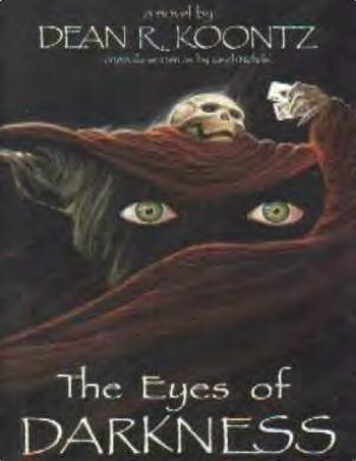
![Fear Nothing [039 5.0] By Dean R. Koontz](/img/5/fearnothing.jpg)
